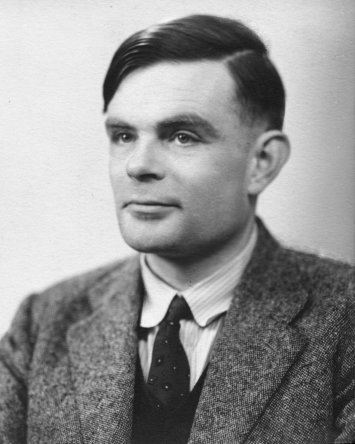Alan Turing, yes, the Alan Turing we all know and love was a genius among men. Although he was not the most notable mathematician of the times, he did invent what is now thought to be the original "general purpose computer" (not personal computer). The Turing Machine, can write, read, and erase binary code. At the beginning of the second World War (1939), the Nazis employed a method of guiding its submarines with encrypted radio codes. This Enigma Machine used by the Nazis coded messages by jumbling up letters with a random pair. With different rotors used to increase security, the encoded messages were extremely difficult to decode by the Allies. Alan Turing was invited to be part of a group of cryptographers in England. He solved the Enigma code within his first few weeks. The Bombe Machine, which Turing created, simulated the Enigma Machine, and could manufacture all possible scrambler codes. Turing also implemented Euristics which could speed up the process, however, made the decoder increasingly less precise. The use of this machine is now thought to be partially responsible for the defeat of the Nazis in WWII.
Turing believed that computers were capable of responding to things a user would input, much like having a virtual conversation with the computer. Turing thought that if the machine would be turned off, it was murder, thus giving way to machine intelligence (artificial intelligence).
Turing was prosecuted for illegal homosexual acts in England (he was only gay, he didn't do anything really illegal). After chemical castration (alternative option to prison) he died two years later because of cyanide poisoning. This concludes my synopsis of the great Alan Turing.
Just look at that jacket.

After pondering the reasoning behind the "Singin' in the Rain" scene for the last few days, I have come up with multiple plausible answers. Malcolm Gladwell famously performed the song during the rape scene of A Clockwork Orange, however, the song was apparently not intentionally used when first filming.
I suspect that many would think the song was used to contrast the gritty-ness of the scene (because the song is typically used to appeal to bright emotions). Also, critics might agree that the scene had to do with the psychological change that occurred within Alex. After watching the clip a few times, my final conclusion is that the director told Gladwell to sing/ dance in order to add substance to the scene. Without the added performance, the scene would be an awkward montage of the goons tying up the contemporary couple. I do still believe there is a connection involving the Lucovico technique and showing of violent movies and cheerful music. Just don't blame the messenger, because I am still pretty lost on this movie.
